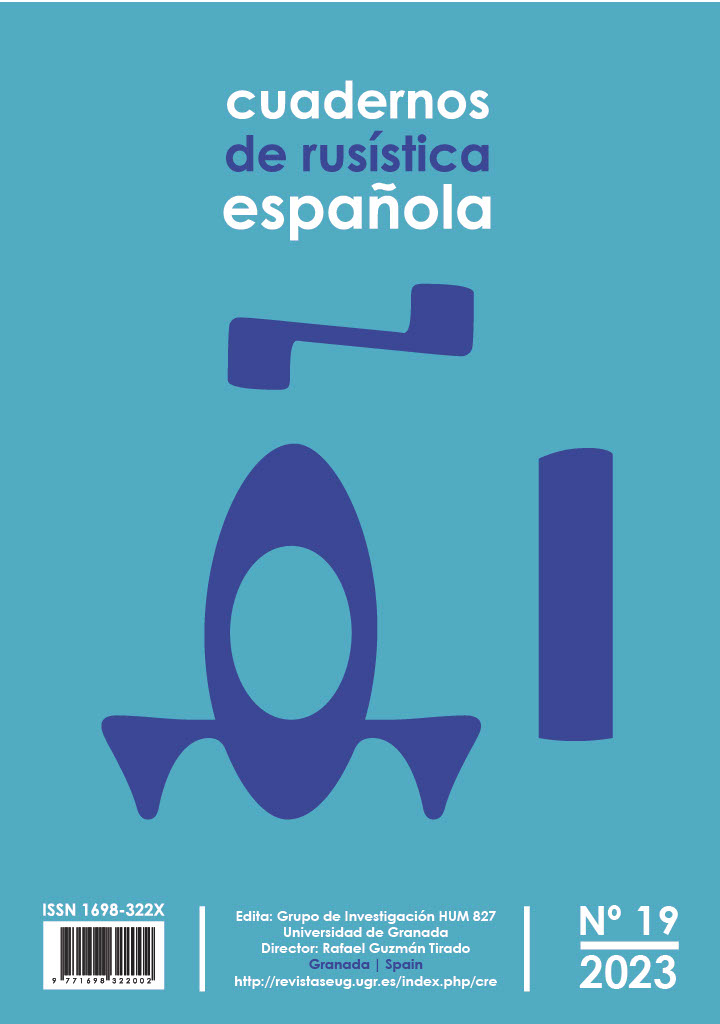Translating Russian Poetry: Considerations and Problems
DOI:
https://doi.org/10.30827/cre.v19.28973Keywords:
poetry, verse, meter, rhyme, Spanish verse, Russian literatureAbstract
The article reviews and contrasts the features of Western and Russian versification as well as considers the aspects that should be followed while translating Russian poetry. Although the Western tradition continues to be known for the distinction between form and content, Russian poetry does not share this binary logic, and both concepts are inseparable. Western poetry became individual, silent and fundamentally written, and Russian verse has not lost its communicative character and remains, therefore, highly phonic. The article presents an overview of both traditions, theoretical considerations on the development of Russian and Western versification, and, finally, the examples in Spanish that highlight points of contact with Russian versification, so that they can be regarded as rhythmic models for a more accurate translation of Russian verse.
Downloads
References
Anikina, O. (2016). O verlibre, sillabotonike y nie tolko. Literatura. https://literratura.org/events/1813-olga-anikina-o-verlibre-sillabotonike-i-ne-tolko.html
Benjamin, W. (1971). “La tarea del traductor”. Angelus Novus. Barcelona: Edhasa.
Berman, A. (2014). La traducción y la letra o el albergue de lo lejano. Buenos Aires: Dedalus.
Catullo. (s.f.). Università degli Studi di Milano. Obtenido de https://www.studocu.com/it/document/universita-degli-studi-di-milano/letteratura-latina/catullo-nugae-1-20-appunti-1-8/1411930
Even-Zohar, I. (2007-2011). Polisistemas de cultura. Tel Aviv: Universidad de Tel Aviv.
Frate, R. (2023). O estabelecimento das formas poéticas na Rússia: as experiências de Trediakóvski, Kantemir e Lomonóssov. RUS (São Paulo), 14(24), 41-62. doi:https://doi.org/10.11606/issn.2317-4765.rus.2023.210039 DOI: https://doi.org/10.11606/issn.2317-4765.rus.2023.210039
Jodasiévich, V. (1938).Nie iambom li chetyrejstopnym. https://slova.org.ru/hodasevich/ne_yambom_li_chetyrekhstopnym/
Lomonósov, M. (1959). Т. 8 :Poeziia, oratorskaia proza, nadpisi. Moskva -Leningrad: AN SSSR. http://feb-web.ru/feb/lomonos/texts/lo0/lo8/lo8-0162.htm
Lomonósov, M. (1986).Pismo o pravilax rosiiskogo stijotvorstva. In М. Lomonosov, Izbrannie proizvedenia. Lenigrad: Sovietskiy Pisatel'. P. 465-472.
Madrid Cobos, E. (2021). Petrarca y los orígenes del soneto. El Coloquio de los Perros. Revista de Literatura. Obtenido de https://elcoloquiodelosperros.weebly.com/artiacuteculos/petrarca-y-los-origenes-del-soneto
Maiakovski, V.V. (1987-88). Sochinieniia v dvuj tomaj: Kak dielat' stiji?. Moskva: Pravda.
Meschonnic, H. (2009). Ética y política del traducir. Buenos Aires: Leviatán.
Tiniánov, I. (2010). El problema de la lengua poética. Buenos Aires: Dedalus.












